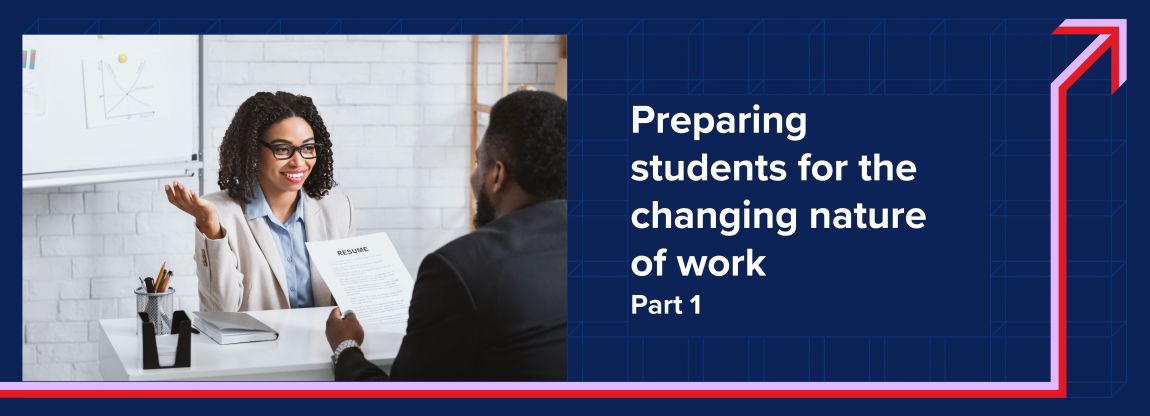Preparing students for the changing nature of work
Preparing students for the changing nature of work
Key Learnings from the Employability & Skills Conference 2022, Part 1
With employability and job-readiness being key themes from many of my conversations with HE academics and professionals recently, it was great to attend the Employability and Skills Conference and hear more from those who are working in this vital area of student success. In Part 1, we will review the future of work and the impact of this on students and graduates.
The future of work


As to be expected, a key theme from the conference was preparing students for the changing nature of work, including hybrid/remote working increasing following the pandemic and future roles that we aren’t even aware of yet. Professor Karen Bryan OBE, Vice Chancellor at York St John University highlighted the lower proportion of graduate jobs in Yorkshire compared to London and the South East and talked about the university’s participation in a local task group bringing together different stakeholders, including employers and local authorities to rectify this.
The priorities for the task group were identified as follows:
- Readiness for the changing nature of work and increase in remote/hybrid working following the pandemic. Like many other already in the workplace, graduates are also more interested in a work/life balance and have more of a focus on the work environment offered by employers. It’s important for employers to be aware of this change in what graduates are looking for.
- In-study & work experience opportunities. It is important for online placements that took place during the pandemic to be continued. Students often need support with articulating the skills gained through their work experience, e.g., student jobs or volunteering as well as study placements.
- Tailored careers and enterprise support, including support with overcoming barriers to employment.
- Models to connect graduates to graduate-level jobs e.g., brokerage system.
- Common messaging on the value of graduates and the value of transferable skills. For example, there aren’t enough computing graduates but Arts students also have computing skills. Employers could look at degree-agnostic specifications and requirements for entry level roles.
Data is an important part of developing effective employability and careers plans at institutions. Greg Burke, Director of Place and Civic Engagement at Sheffield Hallam University and Programme Director at The Civic Universities Network pointed out that universities are often focused on graduate destinations, but this only really covers the first job. It is then assumed that the system works past that. It would be helpful to map further what happens to individuals over their career.
Regarding future roles, Professor Bryan highlighted the paucity of detail around what skills and knowledge might be needed in the future, making it difficult to plan how educational provision is going to meet those needs. Without it, how can we prepare these graduates for the future of work? Research by Dr Helen Hughes, Associate Professor, University of Leeds found that 93% of businesses surveyed expect hybrid working to continue, with 60% expecting employees to be in office only 50% of week. As part of her project, she interviewed student interns to discover which areas they felt they needed further support with. The key areas that emerged centred around understanding organisational culture when remote, including understanding best ways for communication.


Networking was seen as an area they wanted to be able to do more, and interestingly distinguished from relationship building, which they felt they could do. Networking is particularly vital as findings showed students are benchmarking work expectations against housemates, siblings or parents, modelling and emulating what they see from them, which gives them only a limited lens, as they are not being exposed to different industries. They also struggled with visibility in a remote environment, making it difficult to develop their profile or be proactive in asking for opportunities. Feeling somewhat 'out of sight’, the interns felt perhaps too timid in the remote environment to ask for more tasks.
Some suggestions for how to prepare students better included:
- Understanding job role fit – how their job fits with others and wider business.
- Developing a network mindset – help with meeting other people across the business.
- Buddy schemes – giving students an easy point of contact for questions.
- Visibility – helping students to develop communication skills e.g. asking for more tasks.
- The right questions - develop confidence to ask and learn from colleagues.
- Giving tools to resolve conflict – It's easier to hide in the remote environment but that’s not always the best approach!
- Instilling platform etiquette – ensuring they know how and when to use tools.
- Encouraging informal interaction - reaching out to people on LinkedIn, joining in with virtual or in-person socials.
- Setting realistic workload expectations – understanding that there are natural peaks and troughs and discussing how they can get support if overwhelmed.
- Preparing the ground for hybrid working – looking at typical hybrid patterns and understanding how to work effectively in this environment.


It was also highlighted that with “Portfolio Careers” becoming increasingly common (right now people have average of 12 careers up from 3 for previous generations, and in the future, it will be more like 40!), it is important to support students with developing and articulating the skills they’ll need to adapt as their career evolves – perhaps branching in significantly different directions.
As a peer network has been established to be an important factor in portfolio careers, it’s important that students understand the value of establishing strong relationships peer to peer as well as the more traditional view of networking with more senior people.
What is clear is that careers development is as important as ever, if not more so, in a world in constant flux, with changing jobs and a changing demographic of future employees. It's no longer sufficient for employability to be an add-on from a central service, but rather needs to also be pervasive across courses, with instructors doing their part to help students develop the kinds of skills they will so desperately need on graduation. That’s why, at McGraw Hill we are developing our Connect platform, which – more than just a repository for learning resources – helps students develop the good learning habits that they’ll need for lifelong learning, while also allowing them to practise applying theory to realistic workplace scenarios through a wide suite of Application Based Activities, simulations, and virtual labs.
Find out more about Connect.

